Did you know that Ferdinand Marcos Sr., the former president of the Philippines, is widely viewed as a bad leader?
Marcos Sr.’s time as president was marked by bad governance and authoritarian rule. His regime saw human rights abuses and a lot of corruption. The country also suffered from economic plunder.
Many believe Marcos Sr.’s leadership negatively affected the Philippines and its people. He left a legacy that’s marked by these issues. By understanding why he is seen this way, we get a clear picture of the harm his rule caused.
Key Takeaways:
- Marcos Sr.’s presidency was marred by bad governance, authoritarian rule, human rights abuses, economic plunder, and rampant corruption.
- His actions and policies continue to shape the Philippines and the Filipino people today.
- Examining Marcos Sr.’s troubled legacy provides insights into the consequences of his leadership on the country.
A Troubled Legacy: The Presidency of Ferdinand Marcos Sr.
Ferdinand Marcos Sr.’s time as president deeply affected the Philippines. He was in power from 1965 to 1986. His rule involved decisions that changed the nation. Sadly, his term is remembered for human rights crimes, corruption, poor economy, and lack of democracy.
Marcos Sr. faced strong criticism for human rights violations. People spoke of torture, killings without trial, and stopping those against his rule. Such actions made people afraid to speak up, harming both democracy and basic rights.
Aside from these abuses, corruption was a big issue. Marcos Sr. and his allies were accused of stealing huge sums from the government. This corruption hurt the Philippines, adding to its ongoing struggles.
The economic problems under Marcos Sr. were severe. Prices rose fast, yet people’s lives got tougher. Poverty went up as well. Also, the government’s debt grew, making the financial situation worse.
Marcos Sr. used his power to limit freedom and strengthen his own rule. Martial law began in 1972. This step allowed him to control the country more and take away people’s rights.
Summing up, Ferdinand Marcos Sr.’s presidency left a dark mark on the Philippines. His decisions still affect the country today. They show how vital it is to protect human rights, fight corruption, and keep democracy strong.
Continue reading to discover more about the early years and rise to power of Ferdinand Marcos Sr. in Section 3 of this series.
The Early Years and Rise to Power
Ferdinand Marcos Sr. was born on September 11, 1917, in Sarrat, Philippines. He was from a family deeply involved in politics. Marcos Sr.’s father, Mariano Marcos, was a congressman. His mother, Josefa Edralin, was also connected to local politics. This likely sparked Marcos Sr.’s interest in serving the public.
Born into Politics: The Marcos Family Background
Marcos Sr.’s family background was full of politics. His father was a congressman, and his mother’s family led locally. Growing up, Marcos Sr. learned a lot about the government and its power. This childhood knowledge was crucial to his future in politics.
The Path to Presidency: Ferdinand Marcos Sr.’s Political Ascendancy
To become president, Marcos Sr. made many smart political moves. He worked in the House of Representatives and the Senate. He also made friends in key places. One group he joined was the Nacionalista Party, which helped his career grow.
In 1965, Marcos Sr. won the presidency through hard work and good connections. He planned wisely and gathered support along the way. His victory showed his strength as a politician.
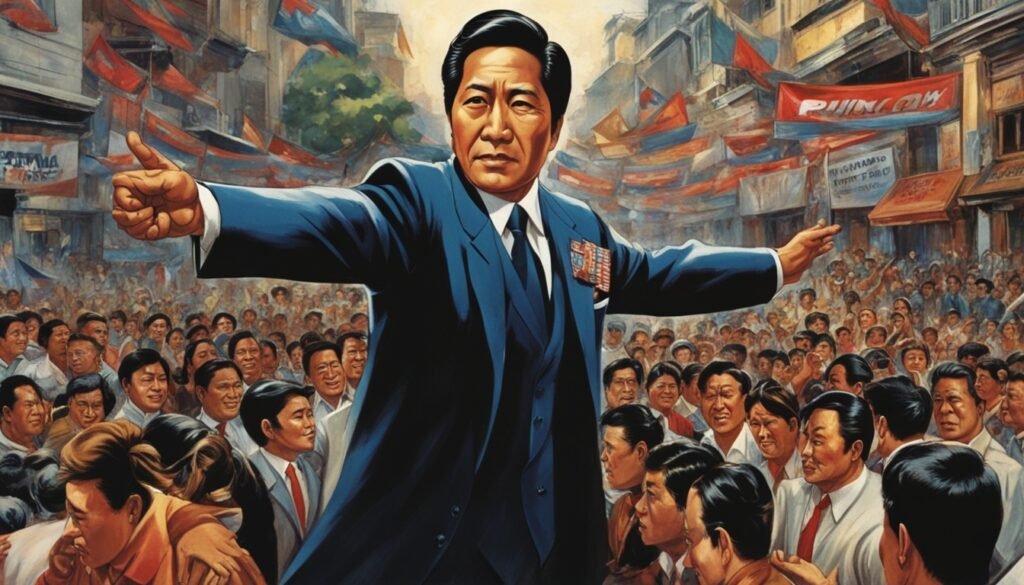
Maros Sr.’s start in politics came from his family’s connections. He learned a lot about governance early on. This knowledge, paired with his strategic decisions, led to his presidency in 1965. These lessons were important for his time as the Philippines’ leader.
Martial Law and Suppression of Democracy
Ferdinand Marcos Sr.’s presidency is known for martial law in the Philippines. This shifted the country towards authoritarian rule and less democracy. He said it was to fight threats from communist and subversive groups. But, it cut people’s freedoms and gave him, his family, and friends more power.
On September 21, 1972, martial law officially started in the Philippines. With this move, Marcos Sr. gained a lot more power. He used this power to control and stop anyone who disagreed with him. The military helped keep his rule, and those against him were put in jail or silenced. This made the country much more authoritarian.
Marcos Sr.’s rule under martial law was tough on those who opposed him and the free media. People like opposition leaders, activists, and regular citizens who didn’t like the regime were punished. They were arrested, locked up, or even made to disappear. The government controlled what the media said, stopping true information from getting out. This helped Marcos Sr. stay in power but gave him a bad name.
Amnesty International talks about the harm martial law did and how it hurt democracy in the Philippines.
Human Rights Abuses Under the Marcos Regime
The Marcos regime, under Ferdinand Marcos Sr., was known for its terrible human rights abuses. These included torture, forced disappearances, and killings without trials. Such acts created fear and stopped people from speaking out against the government.
The Plight of Political Prisoners
Political prisoners in the Marcos regime faced terrible conditions. They were kept in dirty, overcrowded cells. The guards didn’t provide them with basic needs. Many innocent people, including activists, were jailed for years without a fair trial or any legal process.
Disappearances and Torture: A Climate of Fear
During Marcos’ rule, forced disappearances and torture were common. Those who opposed the government, such as activists and journalists, vanished. Their families were left not knowing what happened. The threat of torture and abuse stopped people from speaking up.
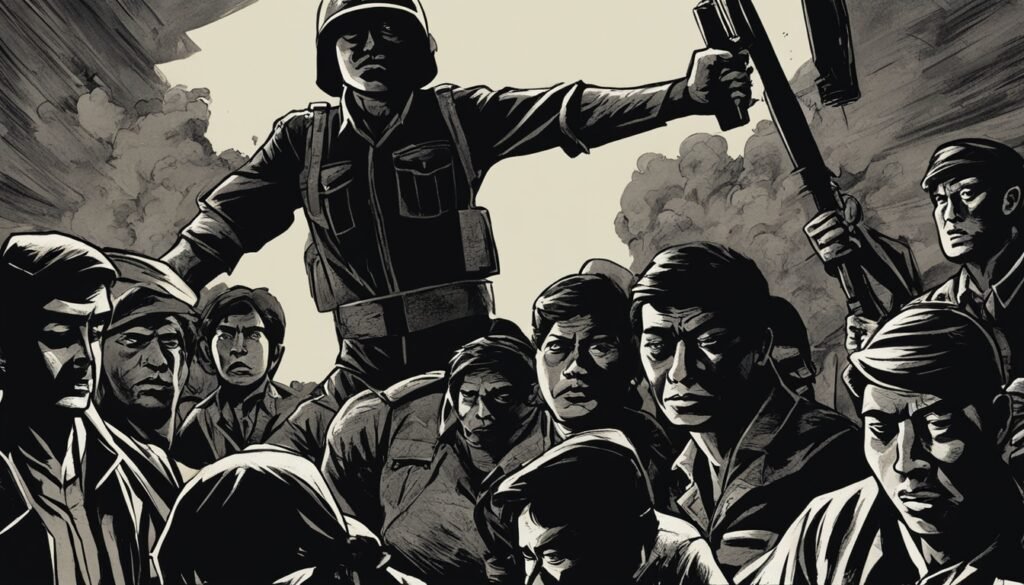
The human rights violations under Marcos’ rule were extensive and are not forgotten. Remembering these events is key to making sure they don’t happen again.
For more about the human rights issues during the Marcos regime, check out this resource.
Grand Larceny: Economic Plunder by the Marcos Family
The Marcos family’s economic crimes seriously hurt the Philippines. Ferdinand Marcos Sr. and his allies stole lots of money while he was president. They took billions from the country, enriching themselves through illegal means.
This action had a huge negative effect on the country and its citizens. The stolen money could have been used for good, like in building better roads or funding schools. Instead, it went into the pockets of Marcos and his friends.
Today, the impact is still felt. It has left many Filipinos without proper services or chances to make a good living.
Bringing to light the full scope of the Marcos family’s crimes is not easy. The corruption and theft were massive. Efforts to get back the stolen money and punish those responsible have faced many challenges.
This article by Rappler looks at the corruption during the Marcos era. It shows how this corruption damaged the country.
| Effects of Economic Plunder by the Marcos Family | Consequences |
|---|---|
| 1. Widespread poverty | The stolen funds could have lessened poverty and improved life for the Filipinos. |
| 2. Lack of investment | The stolen money could have funded projects in areas like roads, schools, and health. |
| 3. Socioeconomic inequality | This plunder made the rich richer and made it harder for the poor to succeed. |
| 4. Loss of public trust | It also made people lose faith in their leaders and their government. |
The harm from Marcos’s actions is still felt. The Philippines struggles to recover the stolen money and to ensure justice. As the nation moves forward, it aims for honest leadership and a more just society.
Bad Economic Management: Crises and Consequences
Ferdinand Marcos Sr.’s time as president brought many economic crises. This hurt the Filipino people. They faced high inflation, more poverty, and lower living standards.
The bad economic management caused prices to rise a lot. Basic needs became too expensive for many. This made life harder for those already struggling. It also widened the gap between the rich and the poor.
The government’s poor handling of money and huge debt made things worse. Marcos Sr. took big loans for projects and his lifestyle. But, they didn’t spend wisely. This brought a financial crisis and a lot of debt that the Philippines is still dealing with.
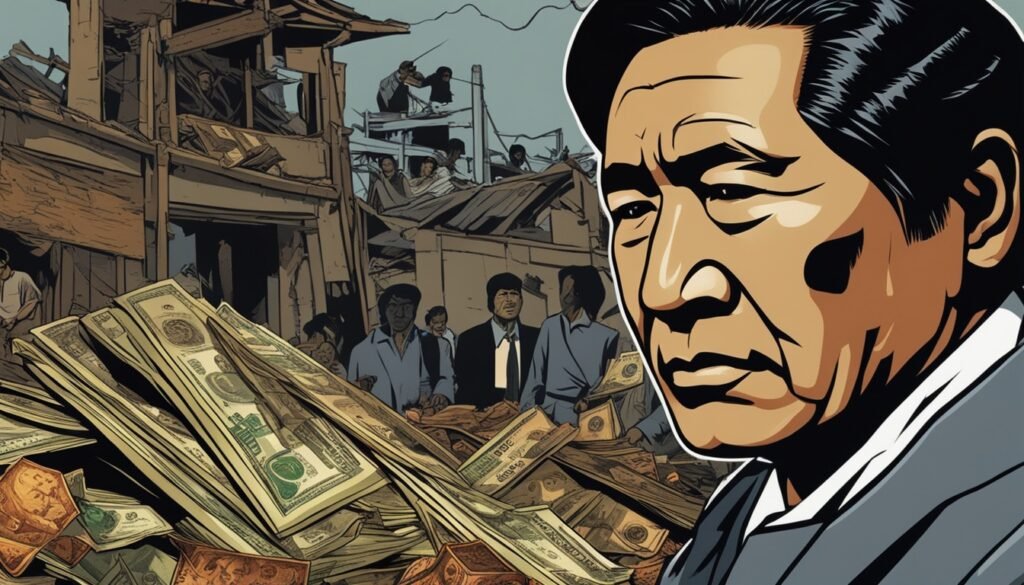
| Economic Consequences of Bad Management | Social Implications |
|---|---|
| – Skyrocketing inflation rates | – Increased poverty rates |
| – Unaffordable basic necessities | – Widening socio-economic inequalities |
| – Financial crisis | – Burden of foreign debt |
Bad economic management had lasting effects on the Philippines. It made growing the economy and moving forward very difficult. Socio-economic gaps got wider and people suffered.
The Impact of Nepotism and Crony Capitalism
Nepotism and crony capitalism were big issues under the Marcos regime in the Philippines. This era saw the former president, Ferdinand Marcos Sr., put his relatives and friends in key jobs. They used these roles to grow rich and powerful. This system hurt how fair competition and meritocracy should work. It widened social and economic gaps.
Favoring family in politics helped the Marcos klane increase its power. Ferdinand Marcos Sr. made his wife, Imelda Marcos, the governor of Metropolitan Manila. He also made his brother-in-law, Fabian Ver, the head of the armed forces. These moves let the Marcoses control important positions. They made decisions without being open or accountable.
Under crony capitalism, certain business and political figures struck deals to benefit each other. During Marcos Sr.’s rule, a few chosen business people close to the government, or “cronies,” got special rights and deals. This system allowed them to get very wealthy and powerful. But it also blocked fair competition and held back the broader economy.
These corrupt practices of nepotism and crony capitalism had a big impact. They led to a small group amassing wealth and power. Meanwhile, many Filipinos were left behind, facing poverty and limited chances to improve their lives. Trust in the government fell, causing many to lose hope. The poor and the powerless felt ignored.
These issues went beyond just money. They weakened the country’s democratic foundations. The unfair distribution of wealth and power was a barrier to building an open and fair society. In this system, your personal connections mattered more than what you could do. This made life harder for those with no political pull.
Today, the shadow of nepotism and crony capitalism still looms over the Philippines. It’s a reminder that, for a nation to truly progress, fairness, transparency, and honest competition are key. Turning things around demands deep changes. We need to support merit, stronger democracy, and look after every Filipino’s well-being and opportunity.
Cultural and Social Impact: The Division of Filipino Society
Ferdinand Marcos Sr.’s time as president deeply affected the culture and society of the Philippines. His policies caused conflict and split the society. People lost faith in the government and lived in fear.
Speaking against the government was dangerous. Those who tried faced punishment like imprisonment. This fear stopped the country from becoming more united.
The effects of Marcos Sr.’s rule are still seen, with broken trust in key institutions and divisions in families and communities.
The unity of the Filipinos suffered greatly, leading to long-lasting distrust and bitterness. This rift challenges the progress of the country, making healing and unity crucial.
Marcos Sr.’s legacy stresses the need for democratic values and respect for all. A truthful look at the past is crucial for a peaceful future.
For more on Marcos Sr.’s presidency’s impact, check out this informative article on cancel culture in the Philippines.
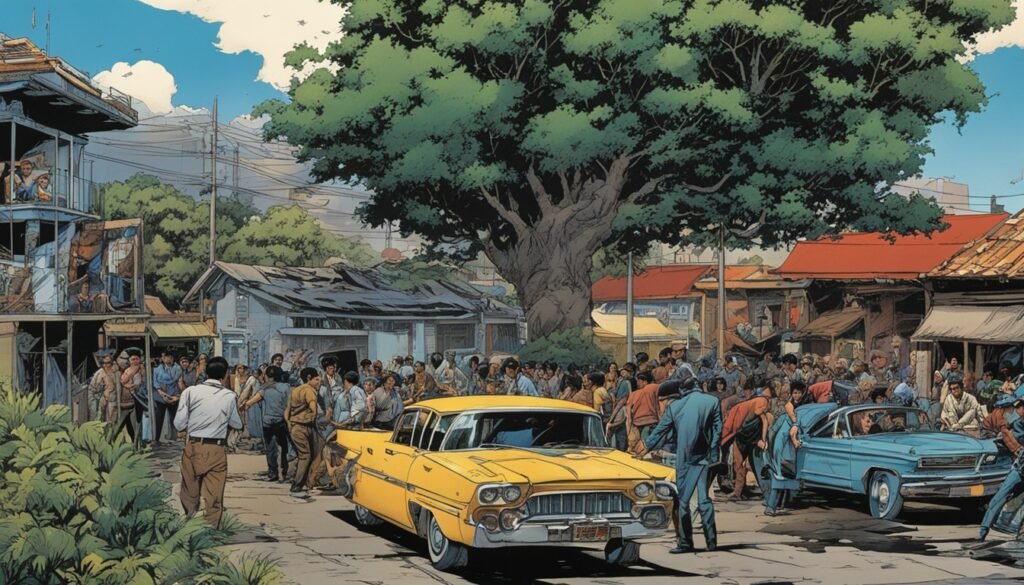
The Extravagance of Imelda Marcos: Icons of Corruption
Imelda Marcos, the wife of Ferdinand Marcos Sr., gained notoriety for her lavish lifestyle and corruption. She had a huge fortune and flaunted it with expensive shoes and art. Her actions showed the world the greed and excess of the Marcos rule.
Imeldific: A Lifestyle of Opulence
During her time as the first lady of the Philippines, Imelda Marcos lived luxuriously. Her love for extravagant shopping, luxury trips, and showing off her wealth was well-known. Her lifestyle symbolized the corruption and greed of the Marcos government.
The Shoes, the Art, and the International Embarrassment
Imelda Marcos owned thousands of pairs of shoes, which came to represent her excessive lifestyle and the regime’s corruption. Her shoe collection was widely known and brought shame to the country. She also spent heavily on art and cultural projects, showing how little she cared for the people of the Philippines.
The Downfall of Marcos Sr.: The People Power Revolution
In 1986, Ferdinand Marcos Sr. faced a significant event, the People Power Revolution. This marked his fall from power. Filipinos from all walks of life came together against his government. They fought for democracy in the Philippines. The movement was peaceful, highlighting the power of people united. This led to Marcos Sr.’s departure and exile in Hawaii.
Millions of Filipinos protested in the streets during this time. They were unhappy with Marcos Sr.’s strict rule. They wanted democracy and an end to his government’s corruption and abuses. The protests were a strong call for change.
The People Power Revolution changed the course of Philippine history. It showed the world how a peaceful movement can overcome oppression. It inspired democracies globally, proving the people’s power against tyranny.
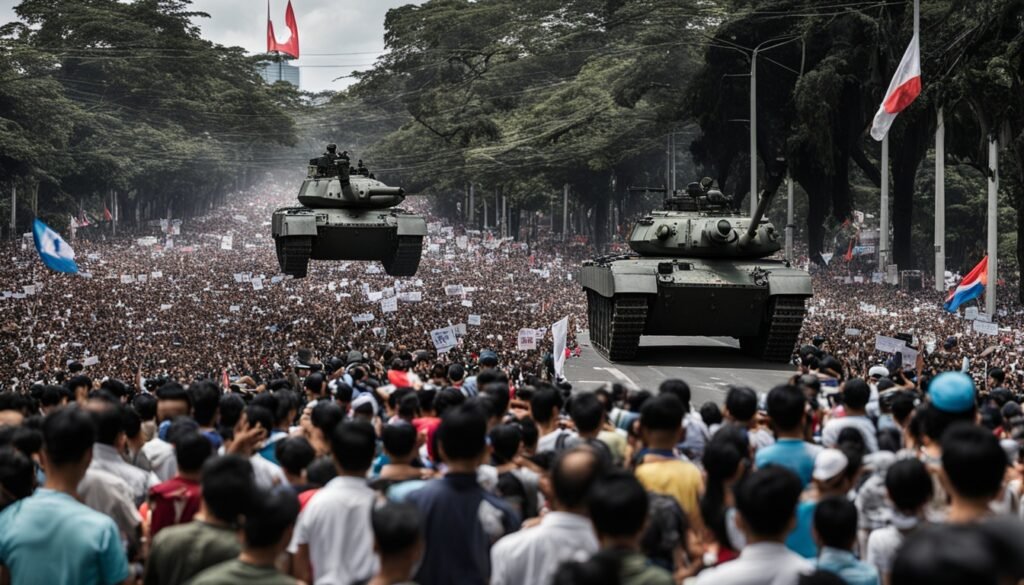
This image shows the courage of the Filipino people during the revolution. They gathered in Manila at EDSA-Ortigas Avenue. Here, they bravely fought for democracy and against Marcos Sr.’s rule.
The revolution ushered in a new era for the Philippines. Corazon Aquino became president, starting new reforms. Its memory still inspires, reminding the nation of the strength in coming together. It emphasizes the need to protect democracy.
For an in-depth look at the People Power Revolution and its impact, check out this article by Rappler: The People Power Revolution: A Bright Spot in World History.
| Key Events of the People Power Revolution |
|---|
| Massive protests and demonstrations |
| Civil disobedience and defiance of martial law |
| Support from various sectors of society |
| Role of religious leaders, military defectors, and media in mobilizing the movement |
| Solidarity and unity among the Filipino people |
| Withdrawal of support from key allies and international pressure |
| Transition of power to Corazon Aquino |
| Exile of Ferdinand Marcos Sr. to Hawaii |
A Nation in Recovery: Post-Marcos Philippines
After Ferdinand Marcos Sr.’s rule, the Philippines began a vital era of recovery. The nation tackled corruption, demanded justice for wrongs, and worked to rebuild its core. The challenges were great but not insurmountable.
Challenging Corruption: The Formation of the PCGG
The Marcos family’s corruption led to the creation of the PCGG. This group investigated and reclaimed assets obtained through corrupt means. They aimed to make the Marcoses answer for their actions and recover stolen funds for the people.
The PCGG made huge strides against corruption. They’ve gotten back billions, including land, money, and art, illegally acquired by the Marcoses. These returns are now funding programs for Filipinos and helping the country get back on its feet.
The PCGG fought for justice by targeting corruption head-on. They’ve shown Filipinos that corruption is being dealt with, and there are penalties for such actions. Their mission is clear.
Legacies and Lessons: The Ongoing Quest for Justice
Marcos Sr.’s legacy still impacts the Philippines. His government’s wrongs, like abuses and economic harm, have left deep scars. These still shape the country today.
Justice for human rights still matters greatly. Many fight to ensure those who caused suffering face consequences. This work is crucial for a fair and just society for all.
Marcos Sr.’s rule taught the Filipino people powerful lessons. It reminded them to guard democracy, fight corruption, and promote good governance. These lessons drive efforts to create a better, fairer country.
As the Philippines advances, seeking justice and remembering past wrongs guide its way. The goal is a future based on honesty, fairness, and the protection of everyone’s rights and happiness.
Learn more about the impact of martial law in the Philippines.
The Marcos Dynasty: Political Comeback in the 21st Century
In the 21st century, the Marcos dynasty stood out in Philippine politics. Ferdinand Marcos Jr., son of Ferdinand Marcos Sr., won the 2022 presidential election. This win brought the Marcos family back to power, worrying some about democracy and authoritarianism in the country.
This event highlights the long-lasting impact of Marcos Sr.’s time as president. His era’s troubles still affect the country’s politics. The Marcos family’s return shows the deep complexities of the Philippine political scene.
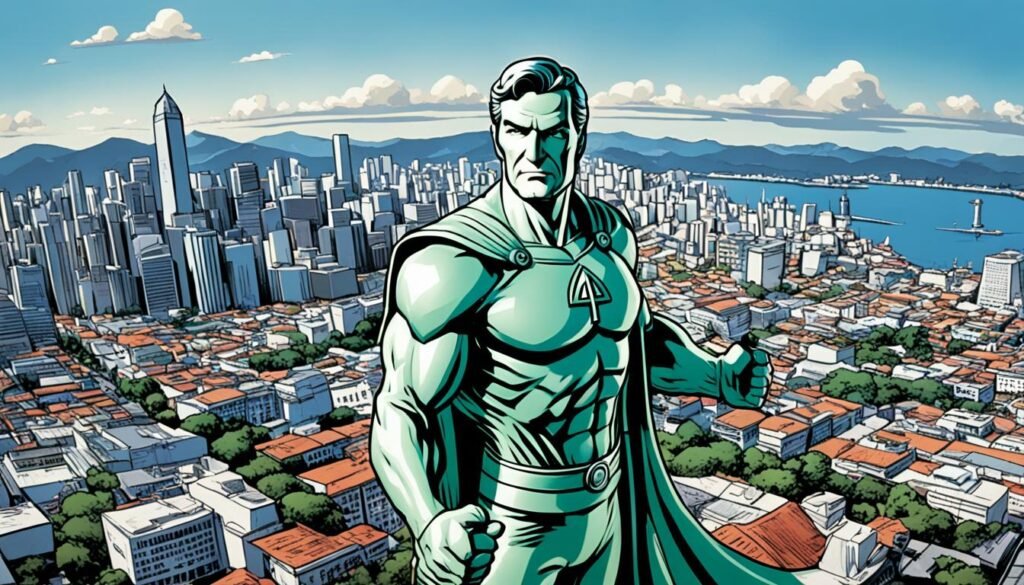
Ferdinand Marcos Jr.’s victory in 2022 created strong reactions in the Philippines. The Marcos family coming back has divided the nation. Some hope for positive change, but others fear for democracy and human rights.
The country still remembers the allegations against Ferdinand Marcos Sr. These include human rights violations and corruption. With his family’s return, discussions about the past and justice have started again.
The ongoing political rise of the Marcos family makes the Filipino people face tough moments from their history. The influence of Marcos Sr.’s time is heavy. It’s crucial for the nation to learn from its past to create a better future.
References:
The Marcos Counterrevolution – Al Jazeera
Conclusion
Ferdinand Marcos Sr.’s time as president of the Philippines has created problems that are still felt today. His use of martial law, disregard for human rights, and corruption have deeply affected the people and the country.
It’s important to understand Marcos Sr.’s rule and its aftermath. He blocked democracy and took away freedoms. This caused fear and stopped people from speaking out. Many suffered because of his human rights violations, including those who were imprisoned or disappeared.
The country also faced economic struggles under Marcos Sr. This included higher prices, poverty, and misuse of money. His family’s unfair wealth and greedy friends made the gap between rich and poor even larger.
Remembering this dark part of history is essential as the Philippines tries to move forward. By looking back, fixing old wrongs, and aiming for fairness and unity, the nation can leave behind Marcos Sr.’s damage. It opens the door for a better life for all Filipinos.


